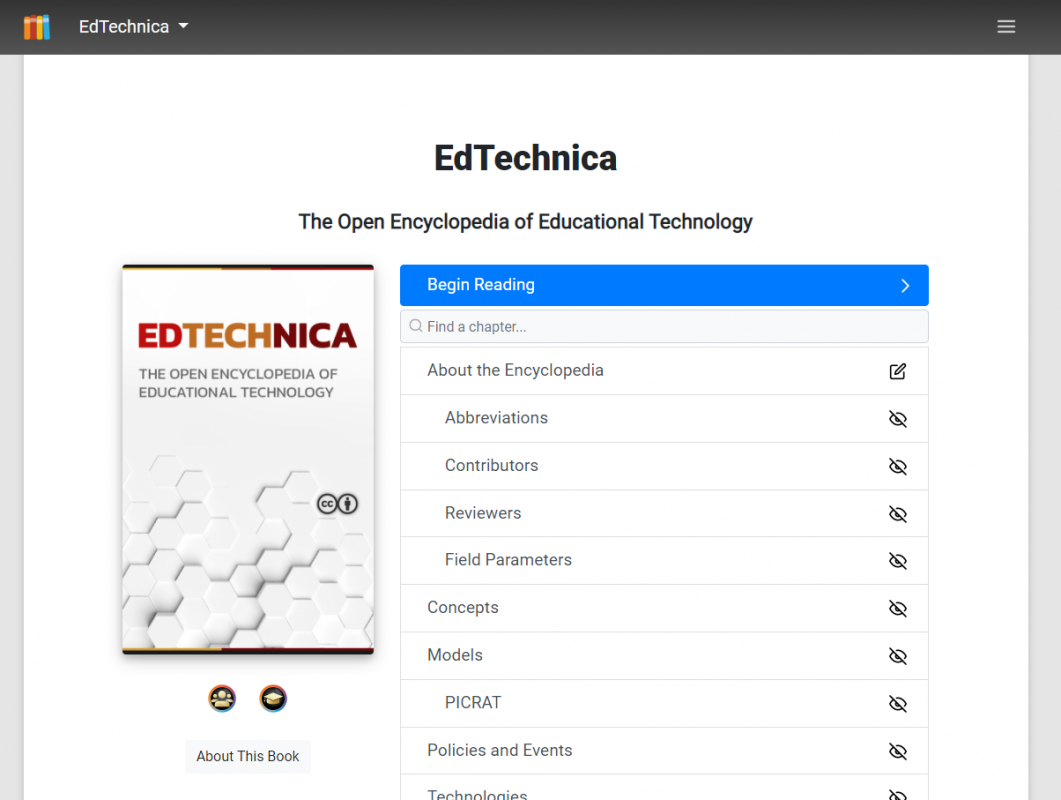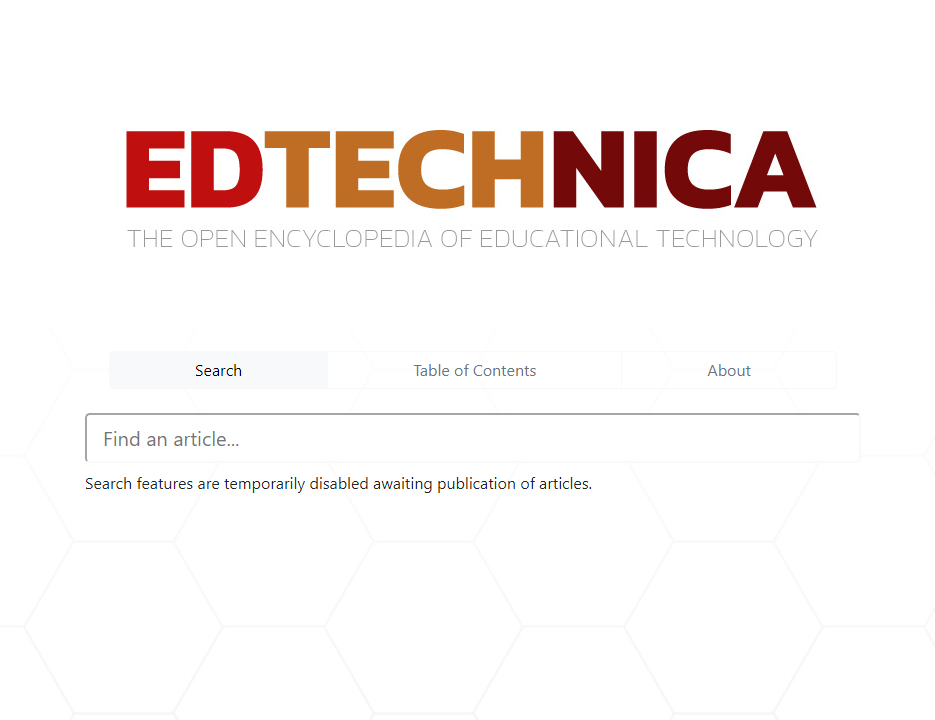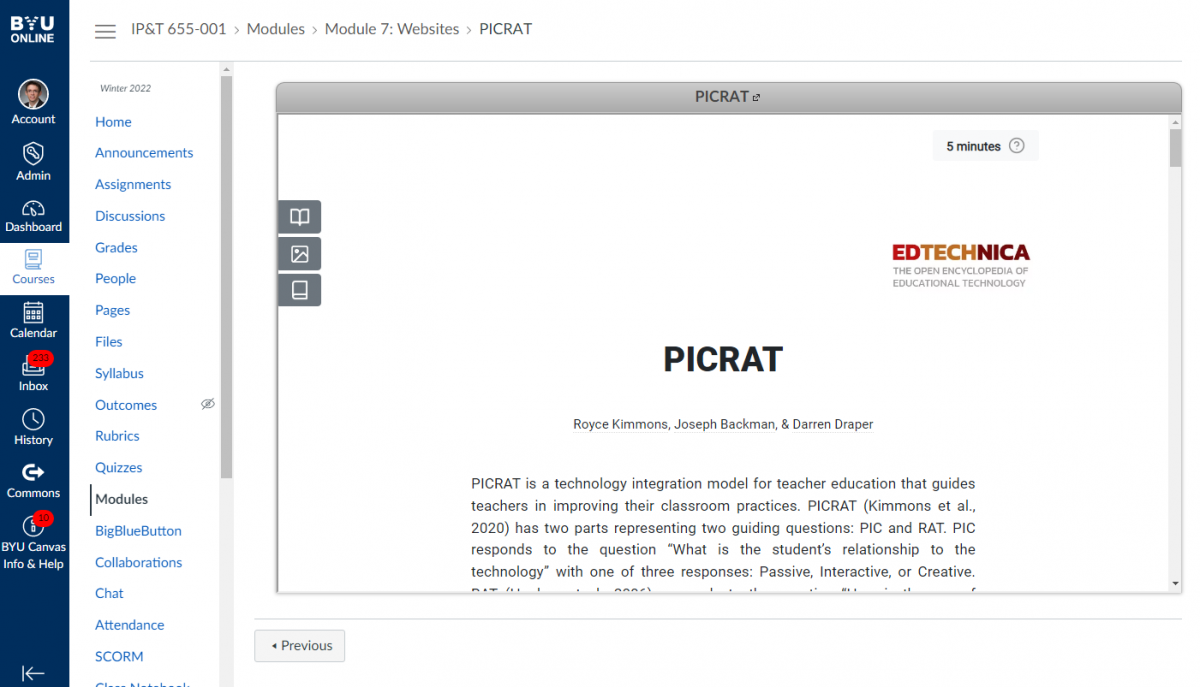The information on this page is provided primarily for the benefit of Editorial Board members to assist in the administration and future development of the encyclopedia.
If you would like to contact encyclopedia personnel, please use one of the email addresses below:
The primary method of communication among the Editorial and Review Boards will be via Slack or email. The Slack channel may be accessed by board members here: https://edtechnica.slack.com/
Communications
EdTechnica uses a variety of opt-in/out email notifications, including the following:
- Alerts to readers for new articles.
- Alerts to reviewers (e.g., invitation to review, reminder, notification of decision).
- Alerts to authors for outdated articles that need updates.
- Alerts to authors of revisions and additional resources regarding decisions.
Inclusive Contribution and Equity Strategy
This encyclopedia seeks both (a) to be authoritative for the field by providing original authors and invested professionals with the ability to establish and explain the meanings of terms and concepts and (b) to be intentionally and proactively inclusive of various perspectives and contexts. Tension exists between these two aims as any attempt at providing a platform for authoritative voice can quickly lead to hegemonic power structures wherein the wealthy, privileged, or more-highly-educated can marginalize those with dissenting (or simply different) views, such as researchers at elite universities minoritizing the voices of K-12 teachers or North American and European scholars minoritizing the voices of other scholars throughout the world.
To help navigate this tension, the Editorial Board will lead efforts to ensure that the encyclopedia grows and evolves to become increasingly representative of and useful to educational technology professionals throughout the world. Some of these efforts are expected to include the following:
- Soliciting new articles from diverse researchers and practitioners.
- Requesting major revisions of articles and soliciting co-authors to incorporate missing and essential viewpoints.
- Inviting diverse scholars and practitioners to participate as reviewers.
- Ensuring that encyclopedia policies and practices are inclusive and do not place additional burdens or expectations upon minoritized contributors.
- Honoring the contributions of diverse authors via acknowledgments, certificates of contribution, and other meaningful recognitions.
- Leading grant-seeking efforts to provide stipends to under-represented and economically disadvantaged authors and reviewers (e.g., contributors from low-income countries, adjunct faculty, school teachers).
Strategic Invitation Planning Document
To help organize invitation campaigns of authors, editors may use the Strategic Invitation Planning Document. This document is not visible to the public.
Contributor Demographics Dashboard
To help ensure transparency and to support the encyclopedia’s commitment to inclusivity and representation, all reviewers and authors will be invited to provide simple demographic identifiers (e.g., gender, race, nationality). Aggregations of these data will be publicly available via a demographics dashboard and will help to inform the Editorial Board’s execution of the Inclusive Contribution and Equity Strategy.
Social Outreach and Marketing Strategy
The Editorial Board will maintain dedicated accounts on prominent social media platforms (e.g., Twitter, Instagram), promoting and sharing articles and announcements. Such communication might include the following:
- Spotlighting newly added or newly updated articles.
- Requesting nominations for the Editorial or Review Board.
- Requesting new articles, artifacts, or revisions.
All posts should include the #edtech and #edtechnica hashtags. Additionally, any shared images should include alternative text, and videos should provide captions to ensure accessibility.
Analytics and Metrics
Google Analytics will be enabled for the volume, and internal analytics will be enabled for the overall volume and each article.
Article authors will have access to their own article metrics, such as the following:
- Views
- Downloads
- Backlinks
- Ratings
- Feedback
- Citations
Editors will have access to the Google Analytics dashboard, which will provide additional metrics of use, including locations of users, relative popularity of articles, and so forth.
Others may also request access to data for scholarly purposes by contacting a site administrator.
Awards
Scholarly Excellence Award
This award is presented each year to authors of the highest quality and most impactful articles in the encyclopedia. Recipients are selected by the Editorial Board using relevant metrics (e.g., ratings, read counts). Each article may only receive this award once.
Reviewer Excellence Award
This award is presented each year to outstanding reviewers, and the recipient is selected by the Editorial Board.
EdTech Books Badges
In addition to these awards, EdTech Books also provides platform-level badges that are automatically awarded to authors. Some of these badges include the following:
- Four-star Author: Awarded if the author’s articles have received at least 100 reader evaluations with an average score of 4.0 or higher on a 5.0 quality scale.
- Silver/Golden Book: Awarded if the author’s works have been accessed a certain number of times (10,000/100,000).
- Silver/Golden Pen: Awarded if the author writes a certain amount of original content (10,000/100,000).
Digital Hosting and Technical Support
Digital hosting and technical support will be provided as a public service by EdTechBooks.org. Additionally, the EdTech Books platform will continue to be developed to meet the ongoing needs of the encyclopedia and its editorial and review boards.
Funding for this technological infrastructure is currently provided by Dr. Royce Kimmons and the Instructional Psychology and Technology department at Brigham Young University. As an openly-licensed volume, however, the encyclopedia can be copied to other hosting services as desired and is not restricted to this platform or funding structure in the future.
Access Methods
To improve usefulness and usability, it is anticipated that encyclopedia articles will be accessed via a variety of methods.
EdTech Books Generic Interface
EdTech Books has a generic book interface that lists all book contents on a single page here: https://edtechbooks.org/-DCRU. This will be the default interface used by most editors and reviewers.
Figure 1
The generic EdTech Books interface

Quick-Search Interface on EdTechnica.org
Given the volume of articles we anticipate publishing, a quick-search interface will also be provided on EdTechnica.org, which will use caching and client-side javascript-enabled searching to allow for fast filtering of articles and definitions. It is anticipated this will be the primary interface used by most readers.
Figure 2
The EdTechnica.org quick-search interface

Embedding
All articles may be easily embedded via iframe into other sites. This means that content may be used in a variety of contexts and is the preferred method for including articles in learning management systems.
When embedding, either the normal view of the article or the simple view may be used. To use the simple view, add “/simple” to the end of the URL.
Figure 3
An example of an encyclopedia page embedded on Canvas using the simple view

EdTech Books Partner Cross-Listings
The encyclopedia may also be cross-listed on partner and institutional sites.
Other Apps
In addition, other apps and websites may provide access to encyclopedia articles using the EdTech Books API, provided that they display suggested citations and abide by licensing requirements.
Printed Versions
PDFs and other versions of articles and the entire encyclopedia will be available for download and printing, though there is currently no plan to provide a constantly-updated, print-on-demand version of the entire encyclopedia for 1-click orders. As the encyclopedia grows, however, abridged versions of the encyclopedia that provide targeted collections of articles may be compiled and made available via Amazon KDP or other services.
Collaborative Volumes
Professional organizations may collaborate with the Editorial Board to create joint calls for articles or to produce focused compilations of select articles. Such collaborations are encouraged and may be useful for providing focused, timely materials to a professional community.
Collaborative volumes should adhere to the following guidelines:
- Articles should follow the same authoring guidelines and reviewing procedures as other articles in the Encyclopedia.
- Articles should be released under a Creative Commons Attribution 4.0 license so that they can be cross-listed in multiple volumes.
- Articles in focused volumes should cite EdTechnica as the original source.
Professional Partnerships
The encyclopedia currently has no professional partnerships.
Goals
Year 1 2022
- Form Review Board
- Elect Editorial Board
- Initiate biannual meetings
- Publish 10 new articles
Year 2 2023
Year 3 2024
- Publish 30 new articles
- Revise/update articles published prior to 2023
Year 4 2025
- Publish 30 new articles
- Revise/update articles published prior to 2024
Year 5 2026
- Publish 30 new articles
- Revise/update articles published or updated prior to 2025
Ideas for the Future and Technical Roadmap
- Add micro-revision suggestion capability
- Add additional resources submission capability
- Add opt-in alerts features for readers, authors, and reviewers
- Allow viewing of historical versions and revisions of articles
- Add a contribution type of Short Entry or Essay
- Add a contribution type of Critique
- Critiques are short articles focused on critical dialogue—correcting misconceptions, dispelling popular myths, or challenging theories or other beliefs—that would be helpful for the community.
- Further streamline review system to use a form
- Add automatic text-to-speech conversion using Amazon Polly or another service
References
Kimmons, R. (2018). The 5 C Guidelines: Prioritizing Principles for Good Academic Writing. In R. Kimmons & R. E. West, Rapid Academic Writing. EdTech Books. Retrieved from https://edtechbooks.org/-RPJj
Williams, D. D. & Kimmons, R. (2022). Qualitative Rigor: How do I conduct qualitative research in a rigorous manner? In R. Kimmons, Education Research: Across Multiple Paradigms. EdTech Books. Retrieved from https://edtechbooks.org/-Tesw
Authorship Acknowledgement
Most of the encyclopedia's policy documents were originally drafted by Dr. Royce Kimmons. They were then shared with members of the educational technology community, who made many suggestions, edits, and comments. As such they reflect the collaborative work of many individuals, including the following:
- Royce Kimmons
- Maha Bali
- Aras Bozkurt
- Emily Bradshaw
- Jeffrey P. Carpenter
- Camille Dickson-Deane
- Karen D. French
- Theresa Holmes
- Isa Jahnke
- Gloria Mora
- Angelica Pazurek
- Enilda Romero-Hall
- Joshua M. Rosenberg
- Cassie Scharber
- Jill E. Stefaniak
- Bon Stewart
- Andrew Tawfik
- Torrey Trust
- Rachel Wadham
- Duane Wilson